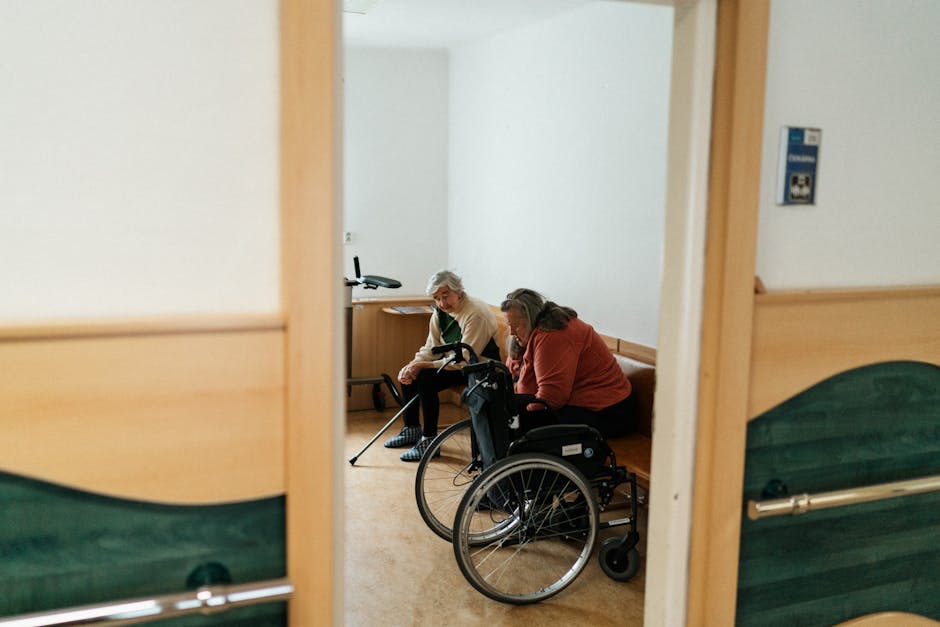Assisted living for elderly: Top 5 Crucial Insights 2025
Assisted living for elderly is about creating a safe, comfortable space where aging individuals can thrive. As people reach this stage in life, they often seek options that offer both care and independence. Assisted living aims to balance these needs by providing a supportive yet engaging environment.
- Safety and Support: Professional care is available around the clock for daily activities.
- Community and Engagement: Opportunities for social connections and activities abound.
- Independence: Residents maintain freedom while getting necessary assistance.
In locations like Sun City Center, FL, assisted living is designed to cater to diverse needs, from health services to community involvement. Elderly care is essential for maintaining quality of life as needs change. Whether it’s through personalized care plans or specialized facilities, seniors can enjoy an environment that promotes well-being and happiness.
Simple Assisted living for elderly word guide:
– Healthcare for seniors
– skilled nursing facilities in sun city center fl
Understanding Assisted Living for Elderly
Key Features of Assisted Living
Assisted living is all about balancing care with independence. Here, seniors can live in a supportive environment while still enjoying the freedom to engage in activities they love.
Daily Activities and Personal Care: Residents receive help with daily activities like bathing, dressing, and eating. This support ensures they can maintain their dignity and comfort.
Amenities and Services: Facilities often include amenities like fitness centers, gardens, and libraries. Services might include housekeeping, meal preparation, and transportation. These features make life more convenient and enjoyable.
Safety: Safety is a top priority. Assisted living facilities have staff available 24/7 to respond to emergencies. This constant availability provides peace of mind for both residents and their families.
Assisted Living vs. Other Care Options
When considering elderly care, it’s crucial to understand the differences between assisted living and other options like nursing homes, independent living, and memory care.
Nursing Homes: These are ideal for seniors who need constant medical supervision. Unlike assisted living, nursing homes provide intensive care and medical attention.
Independent Living: This option is for seniors who can manage most daily tasks on their own. It offers a community setting without the level of care provided in assisted living.
Memory Care: Specifically designed for individuals with memory issues like dementia, memory care facilities offer specialized staff and programs to ensure safety and engagement.
Each option serves a different purpose, and the choice depends on the individual’s needs and health conditions. Assisted living, in particular, is perfect for those who need some help but still wish to lead an active lifestyle.
Costs and Payment Options for Assisted Living
How to Pay for Assisted Living
Paying for assisted living for elderly individuals can seem overwhelming, but there are several options available that can help. Understanding these can ease the financial burden and make the transition smoother.
Private Pay: Many families start by using personal savings or income to cover the costs of assisted living. This can include pensions, retirement accounts, or help from family members.
Long-Term Care Insurance: This type of insurance is designed to cover services like those provided in assisted living. Policies vary, so it’s important to review the terms to see what is covered and for how long.
Financial Assistance: There are programs available to help offset costs for those who qualify. For instance, some facilities may offer sliding scale fees based on income.
Medicaid: In some cases, Medicaid can help cover assisted living costs. Eligibility varies by state, and it often requires meeting specific income and asset criteria. It’s worth exploring if you think you might qualify.
VA Benefits: Veterans and their spouses may be eligible for benefits that can help pay for assisted living. The Aid and Attendance benefit is one such option that provides financial assistance for long-term care.
Reverse Mortgage: For homeowners, a reverse mortgage can provide funds to pay for assisted living. This option allows you to convert part of your home equity into cash, without having to sell your home.
Each of these options comes with its own set of requirements and benefits. It’s crucial to research and consider all possibilities to find the best financial solution for your situation. This way, you can focus more on finding the right care environment for your loved one.
Next, we’ll explore how to choose the right assisted living facility, considering factors like location, amenities, and resident satisfaction.
Choosing the Right Assisted Living Facility
Factors to Consider
When selecting an assisted living for elderly individuals, several important factors come into play. Each one can significantly impact the quality of life for your loved one. Here’s what to keep in mind:
Location
The location of the facility is crucial. Consider how close it is to family members, friends, and essential services like hospitals. Being near loved ones can make visits easier and more frequent, which is comforting for both the resident and the family. A convenient location in Sun City Center, FL, for example, offers easy access to local amenities and medical care.
Amenities
Look for facilities that offer a wide range of amenities. These can include dining options, recreational activities, and transportation services. Engaging amenities not only improve the quality of life but also promote social interaction, which is vital for mental health.
Resident Satisfaction
Researching resident satisfaction is essential. Facilities with high satisfaction rates often have happy residents and families. You can gauge this by reading reviews, visiting the facility, and speaking with current residents and their families. Positive feedback often indicates a well-managed and supportive environment.
Care Level
Assess the level of care provided. Some facilities offer basic assistance with daily activities, while others provide more intensive support for those with medical needs. Make sure the facility can meet the current and future care needs of your loved one.
Community Size
The size of the community can affect the atmosphere of the facility. Larger communities may offer more amenities and activities, while smaller ones might provide a more intimate and home-like setting. Consider what environment your loved one would feel most comfortable in.
Staff Ratio
A low staff-to-resident ratio is often a good indicator of personalized care. It means more staff are available to assist residents, ensuring that individual needs are met promptly. Inquire about the facility’s staffing levels to ensure your loved one will receive the attention they deserve.
By carefully considering these factors, you can choose a facility that not only meets the practical needs of your loved one but also provides a nurturing and supportive environment.
Next, we’ll address some frequently asked questions about assisted living to help you make informed decisions.
Frequently Asked Questions about Assisted Living for Elderly
How is most assisted living care usually paid for?
Most people pay for assisted living for elderly individuals using private pay methods. This means they use personal savings, retirement funds, or family contributions to cover the costs. Private pay is common because it offers flexibility and choice in selecting a facility.
Another option is long-term care insurance. This type of insurance helps cover the cost of assisted living, but it’s important to have a policy in place before the need arises. Policies vary, so check the specifics to see what is covered.
What is the monthly cost of assisted living?
The cost of assisted living varies by location. On average, the national cost is around $4,500 per month. However, costs can be lower in some states. For example, in Texas, the average cost is $3,312 per month, which is below the national average.
It’s important to research costs in your specific area. For instance, in San Antonio, the average cost is $3,066 per month. Knowing these figures helps families plan and budget effectively.
How do you pay for assisted living when you have no money?
If personal funds are limited, there are options to help cover the cost of assisted living. Medicaid is a government program that can assist with long-term care costs for those who qualify. Eligibility and benefits vary by state, so check local guidelines.
Supplemental Security Income (SSI) is another option for those with limited income and resources. It provides monthly payments to help cover basic needs, including assisted living.
For those who own life insurance, life settlements can be a way to access funds. By selling a life insurance policy, seniors can receive cash to help pay for their care needs.
Each of these options has specific requirements and benefits, so it’s crucial to explore them thoroughly to find the best fit for your situation. Understanding these financial avenues can ease the transition into assisted living and ensure your loved one receives the care they need.
Conclusion
At Sun Towers Retirement Community, we believe in providing a seamless and supportive environment for our residents. Our continuum of care ensures that as your needs change, you can continue to live comfortably within the same community. This approach, known as aging in place, allows residents to transition smoothly from independent living to assisted living, memory care, or skilled nursing, all under one roof.
Our community in Sun City Center, FL, is designed to cater to the diverse needs of our seniors. With a range of services and living options, we strive to make every resident feel at home. Whether you need minimal assistance or more comprehensive care, our dedicated team is here to support you every step of the way.
Choosing the right care option is a significant decision, and at Sun Towers, we are committed to making that choice easier by offering personalized care plans, engaging activities, and a safe, nurturing environment. Our goal is to improve your quality of life, providing peace of mind for you and your family.
For more information on our skilled nursing facilities and how we can support your journey of aging in place, visit our Skilled Nursing Facilities page. Let us help you open up the best of your golden years with care, compassion, and community.





















